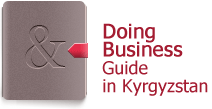How will new competition law affect businesses in the Kyrgyz Republic?
Ruslan Sulaimanov, Junior lawyer
HOW WILL NEW COMPETITION LAW AFFECT BUSINESSES IN THE KYRGYZ REPUBLIC?
The law “On competition”, enacted on July 22, 2011, has replaced the former law “On limitation of monopolistic activity, development and protection of competition”, thus, establishing a new legal environment for many businesses operating in the Kyrgyz Republic. The preamble of this new normative legal act proclaims that the law is oriented towards prevention, limitation, suppression of monopolistic activity and unfair competition as well as towards provision of conditions for creation and effective functioning of markets in the Kyrgyz Republic. Despite the fact that the objective is quite similar to the one which was provided in the former legislative act, the new competition law offers new legal concepts, mechanisms and methods for achieving free, fair and competitive market conditions for businesses in the Kyrgyz Republic.
A notable alteration produced by Kyrgyz legislators is the significant increase in a number of restricted unfair competition forms. Apart from those practices which were already prohibited by the former law, the new law “On competition” forbids to copy, recreate and sell a product if such action violates patent and licensing rights of another business entity, thus, providing additional protection to intellectual property rights of a competing enterprise. Starting from the enactment of the new law, it is also restricted to disclose distorted information on the production potential of a competitor or to disrupt deliberately the business relations of a competitor. Influencing the employees of a competitor with the aim to make them not to fulfill their obligations or influencing a competitor’s decision making capability in order to obtain a competitive superiority over him are also considered to be unfair competition forms. Along with protection of producers, the new law provides additional security to consumers as well, since its provisions ban certain practices, such as: to provide a product with an irrelevant label (with the purpose to confuse customers) or to sell a certain product intentionally in massive quantities in order to manipulate market prices. Arrangements, including concerted actions, which limit the competition, now also specifically fall under the category of an unfair competition.
Besides, the arrangements limiting competition are specified and defined in a much more detailed way than in the former law. Before enactment of the new law, such arrangements were prohibited only if one or both of the agreeing parties took a dominant position on a market (more than 35% of the market share). However, now anticompetitive arrangements are prohibited irrespective of such criteria. In addition, the provisions of the competition law widen the scope of anticompetitive practices by including in this category the arrangements between competing parties which set the aim: (i) to increase, decrease or maintain prices on one level within a market; (ii) to coordinate the volumes of production with the aim to change artificially the volume of supply; (iii) to establish a price discrimination; (iv) to decrease or stop unreasonably the supply of goods; (v) to set up provisions in a contract which put consumers in a disadvantaged position; and (vi) to provide to certain business entities the opportunity to purchase a significant part of products when the conditions of limited supply exist. The new law has also provided the opportunity for some fair businesses to make certain arrangements despite their anticompetitive character if such businesses can prove that positive effects of such arrangements supersede negative consequences produced by them.
The legal modifications elucidated in this article do not represent the exhaustive list of changes presented by the new competition law, but they are the most crucial ones. It should be noted that the updated legal framework in the form of a new competition law is a big step forward which provides additional protection for fair businesses in the Kyrgyz Republic. Moreover, these legal novelties which have appeared in 2011 clearly set up a new juridical approach directed towards construction of a free and competitive Kyrgyz market.
(First published in the newspaper “The Times of Central Asia”, April 12, 2012)














